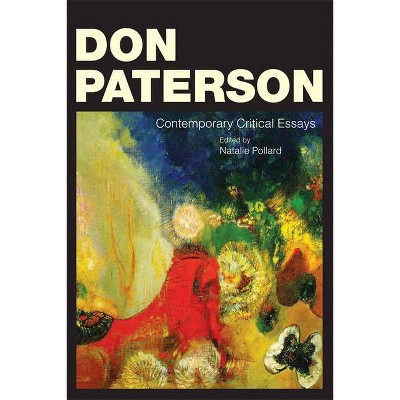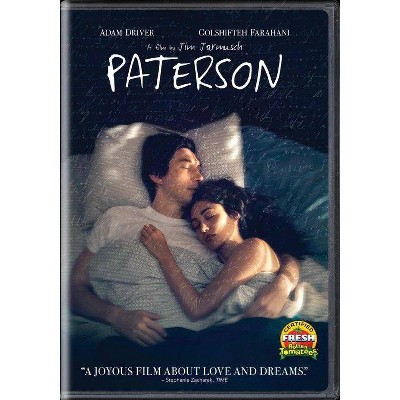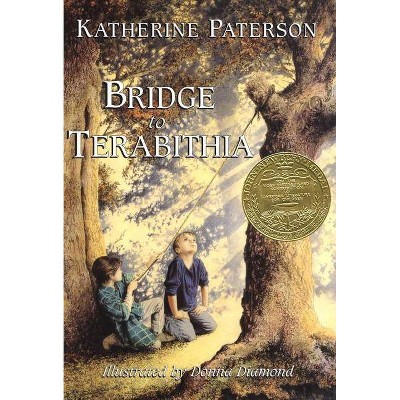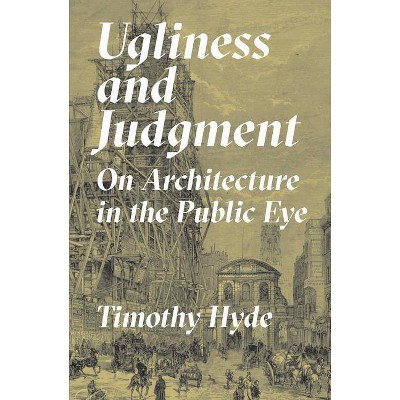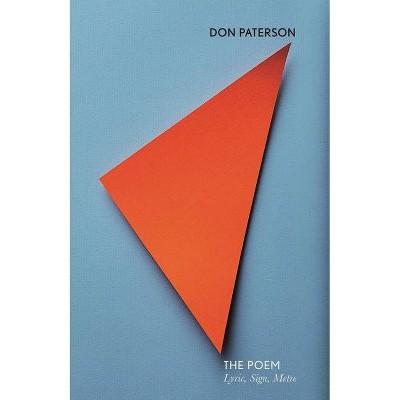Final Judgment - by Alan Paterson (Hardcover)
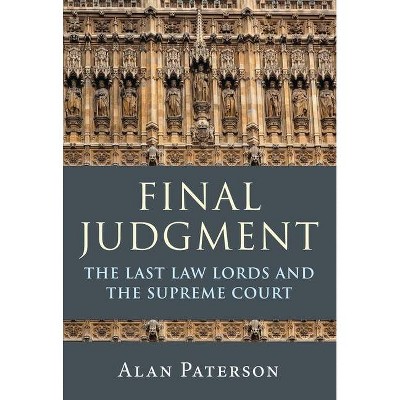
Similar Products
Products of same category from the store
AllProduct info
<p/><br></br><p><b> About the Book </b></p></br></br>Drawing on over 100 interviews, including a total of 36 Law Lords, this book provides a compelling and unrivalled view into the workings of the Court during its final decade, and into the formative years of the Supreme Court.<p/><br></br><p><b> Book Synopsis </b></p></br></br>The House of Lords, for over 300 years the UK's highest court, was transformed in 2009 into the UK Supreme Court. This book provides a compelling and unrivalled view into the workings of the Court during its final decade, and into the formative years of the Supreme Court. Drawing on over 100 interviews, including more than 40 with Law Lords and Justices, and uniquely, some of their judicial notebooks, this is a landmark study of appellate judging 'from the inside' by an author whose earlier work on the House of Lords has provided a scholarly benchmark for over 30 years.<br/> <br/>The book demonstrates that appellate decision-making in the UK's final court remains a social and collective process, primarily because of the dialogues which take place between the judges and the key groups with which they interact when reaching their decisions. As the book shows, the forms of dialogue are now more varied, yet the most significant dialogues continue to be with their fellow Law Lords and Justices, and with counsel. To these, new dialogues have been added, namely those with foreign courts (especially Strasbourg) and with judicial assistants, which have subtly altered the tenor and import of their other dialogues. <br/><br/>The research reveals that, unlike the English Court of Appeal, the House of Lords in its last decade was only intermittently collegial since Lord Bingham's philosophy of appellate judging left opinion writing, concurrences and dissents largely to individual preference. In the Supreme Court, however, there has been a marked shift to team working and collective decision-making bringing with it challenges and occasional tensions not seen in the final years of the House of Lords. The work shows that effectiveness in group-decision making in the final court turns in part on the stages when dialogues occur, in part on the geography of the court and in part on the task leadership and social leadership skills of the judges involved in particular cases. <br/>The passing of the Human Rights Act and the expansion in judicial review over the last 30 years have dramatically altered the two remaining dialogues - those with Parliament and with the Executive. With the former, the dialogue has grown more distant, with the latter, more problematic, than was the case 40 years ago. The last chapter rehearses where the changing dialogues have left the UK's final court. Ironically, despite the oft applauded commitment of the new Court to public visibility, the book concludes that even greater transparency in the dialogue with the public may be required.<br/><br/>'The way appellate judges at the highest level behave to each other, to counsel, with other branches of government and with other courts is brought under closer scrutiny in this book than ever before...The remarkable width and depth of his examination...has resulted in a work of real scholarship, which all those who are interested in how appellate courts work all over the common law world will find especially valuable.'<br/>From the foreword by Lord Hope of Craighead KT<br/><br/>'Alan Paterson's knowledge and interest in the Supreme Court, coupled with his expertise as a lawyer who understands the legal system and the judicial process, make him a perfect chronicler and assessor of what the Court's role is and what it should be, and how it functions and how it might improve.'<br/>Lord Neuberger, President of the Supreme Court<p/><br></br><p><b> Review Quotes </b></p></br></br><br><p>"...an admirably researched, readable and fascinating addition to the growing literature on how judges go about their work." --<i>New Law Journal, Volume 164, Issue number 7594</i> <p/>"Unless you're a Supreme Court Justice or a retired Law Lord, this book offers you the best available insight into how our highest court operates. In fact, even if you are on the Supreme Court, you're likely to learn something from <i>Final Judgment</i>. <p/>What I've not told you is how unusually gripping <i>Final Judgment</i> is. Reading it over the Christmas holiday, I found it hard to put down - something I don't often feel when reading academic works. More than anything else, <i>Final Judgment</i> is a work of human intelligence about the inner workings of one of our most important institutions. I'll be rereading it soon, and revisiting it often." --<i>Head of Legal</i> <p/>"...a wise, perceptive, and at times funny work of scholarship... <p/>...there is a huge amount of interest in this book for anyone interested in the judicial process. It is far from reverential, and the reader will come away with a much better idea of how judges at the top of the tree really make their decisions." --<i>UK Human Rights Law Blog</i> <p/>"Mandatory reading for anyone professing interest in the common law." --<i>The Times</i> <p/>"...ground-breaking..." --<i>The Times</i> <p/>"[An] entertaining and informative account of his discussions with Supreme Court judges" --<i>The Times</i> <p/>"This fascinating and compelling account of the two courts before, during and after the transition, is a superb sequel to the author's first detailed examination of the UK final court of appeal." --<i>Scottish Legal Action Group Bulletin</i> <p/>"[This] marvelous new book [is one] that anyone teaching or writing about the U.S. Supreme Court or equivalent courts around the world should read." --<i>Law and Politics Book Review, Volume 24, Number 3</i> <p/>"The book is a true work of scholarship. With great clarity and with the assistance of empirical research, it takes the reader deep into the judicial decision making process and explores the factors which impact on that process. It provides the reader with a unique and captivating insight into the inner working of the highest court in the country and explains the consequences of the dialogues which the judges engage in and the impact these have upon the judicial thinking and will be welcome to academics and practitioners alike." --<i>Civil Justice Quarterly, Volume 33(3)</i> <p/>"It is both a fascinating survey and real life 'behind the scenes' review of the work of the Law Lords ... and their role in the highest court in the land. The work is unique in providing intimate portraits revealing the character and idiosyncrasies of the individuals who determine and apply the law at the ultimate level, because Paterson understands something that the Victorians also knew: that to comprehend the reasons why judgments are reached, one has to look beyond the mere 'letter of the law'. <p/>There is so much in this book that a review like this can only highlight some of the immediate and obvious points of interest, likewise it is difficult to offer any critical comment. There is a wealth of contextual information, examples and details that others will easily find engrossing and of significant relevance." --<i>Law, Crime and History, Volume 2, 2014</i> <p/>"This is an excellent monograph. The themes are clear and relevant, the research is meticulous. It is fun to read in places; some of the stories about counsel and judges, even academics, make one smile. Of course, many of those characters express themselves wonderfully, which also makes for a good read." --<i>Cambridge Law Journal, Volume 73(2)</i> <p/>"The book is a mine of information...Patterson has assembled detailed evidence about what happens behind closed doors...[A] marvellous read and an outstanding work of legal scholarship." --<i>Journal of Law and Society, Volume 41(4)</i> <p/>"...the book makes an invaluable contribution to our understanding of judicial decision-making, since it is based on information that was unavailable so far, and without Paterson's research would have been lost to posterity. It is not an exaggeration to say that <i>Final Judgment </i>"provides a compelling and unrivalled view" into appellate judicial decision-making in the UK (i), and must be compulsory reading for everyone interested in how the UK Supreme Court works." --<i>The Edinburgh Law Review</i></p><br><p/><br></br><p><b> About the Author </b></p></br></br>Alan Paterson, LLB (Edin), DPhil (Oxon), Solicitor, OBE, FRSA, FRSE is a Professor of Law and Director of the Centre for Professional Legal Studies at the Strathclyde University Law School. His research has focused on the legal profession, access to justice, poverty legal services and the judiciary.
Price History
Price Archive shows prices from various stores, lets you see history and find the cheapest. There is no actual sale on the website. For all support, inquiry and suggestion messagescommunication@pricearchive.us

